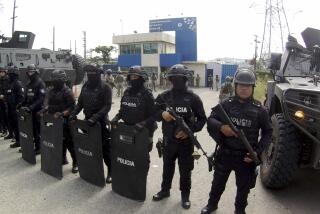Crowd Besieges U.S. Embassy in Macedonia
SKOPJE, Macedonia — Chanting “NATO out of Yugoslavia!” more than 2,000 demonstrators hurled stones and firebombs at the U.S. Embassy in Macedonia and tried to storm it Thursday before riot police drove them away with tear gas.
As the protesters charged the U.S. compound, flames swallowed three nearby cars until firefighters arrived to extinguish the blazes. There were no injuries reported, but the barrage shattered embassy windows.
The siege came hours after Prime Minister Ljubco Georgievski warned against rising anti-NATO and anti-American sentiment, as the Western alliance’s air war against neighboring Yugoslavia continued for a second straight day.
“The two biggest problems the country is facing at the moment are the inflow of refugees from Kosovo and the emergence of anti-NATO and anti-American feelings among the Macedonian public,” Georgievski said.
The U.S. Embassy was not the sole target of the demonstrators’ anger. Hundreds gathered outside the missions of other NATO members--including France, Britain and Germany--before police dispersed them with tear gas.
Britain said its embassy was closed because of damage, but that none of its staff had been injured.
Demonstrators also marched to a nearby hotel housing officials of the Organization for Security and Cooperation in Europe, which oversees peace monitors in Kosovo. Waving the flags of Yugoslavia and pre-independence Macedonia, the demonstrators damaged a number of OSCE vehicles.
Macedonia has supported the NATO attacks against Yugoslavia, but nationalists and members of the Serbian minority in this former Yugoslav republic, which became independent in 1993, are anti-Albanian and sympathetic to Belgrade. Many Macedonians also dislike the growing NATO presence in the country, which runs along Kosovo’s southern border.
Many nationalists here fear Macedonia’s delicate ethnic balance could be affected by the influx of refugees from Kosovo, where ethnic Albanians make up 90% of its population of 2 million people. The three border posts with Yugoslavia were open Thursday, but did little business.
Ethnic Albanians are thought to make up as much as 40% of Macedonia’s population.
Unlike their cousins in Kosovo, they have not openly called for autonomy, but many have espoused the hope of one day uniting Albanians spread across Albania, Kosovo and Macedonia.
Macedonia says it already has 20,000 refugees from Kosovo and can’t handle any more.
In his remarks Thursday, Georgievski expressed his own frustration at the lack of support from members of the international community in assisting with the refugees, saying “they have done nothing to make the consequences less severe except for sending moral messages.”
The European Union announced Thursday that it would send $2.2 million in emergency aid to help refugees--with most of it going to Macedonia.
Greece and Italy also were sending humanitarian aid, including food and medicines.
More to Read
Sign up for Essential California
The most important California stories and recommendations in your inbox every morning.
You may occasionally receive promotional content from the Los Angeles Times.










